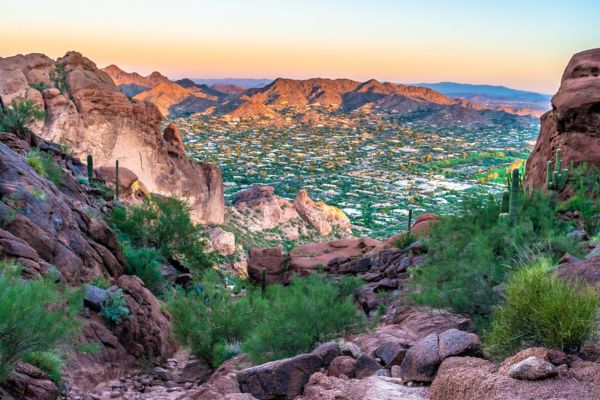
- Details
- By San Carlos Apache Tribe Chairman Terry Rambler
To pass the seminal Groundwater Management Act of 1980, state politicians exempted the powerful mining industry from restrictions on how much water mines can pump. That decision is now colliding with the stark reality that Arizona is facing an economically devastating deficit in groundwater supplies.
The 1980 law allows mines to pump unlimited groundwater without paying the state a dime. Based on current water prices, Arizona is poised to give away $400 billion worth of diminishing groundwater to the two largest foreign-owned mining companies in the world that plan to construct the Resolution Copper Mine 70 miles east of Phoenix.
In Arizona, groundwater use by mines is largely unregulated, essentially giving mining interests priority ahead of municipal and agricultural users for our increasingly scarce water resource. Resolution Copper Company, a joint venture between Anglo-Australian miners BHP and Rio Tinto, is poised to cash in on Arizona’s lax groundwater laws to operate a mine 7,000- feet below ground that will require huge amounts of groundwater for the next 50 years.
Resolution Copper estimates it will extract 40 billion pounds of copper, currently worth $3.80 a pound, for a total gross value of $152 billion, which is far less than the value of the water it will consume.
A recent report released by the Arizona Department of Water Resources (AZDWR) has determined that groundwater supply in the Phoenix Active Management Area will fall short of demand by 4.9-million-acre feet over the next century. (AZDWR, June 2023, Groundwater Flow
Model of the Phoenix Active Management Area). Governor Katie Hobbs, on June 1, announced a pause of new home building in parts of the greater Phoenix area that rely on groundwater. But she is powerless to stop the biggest threat to groundwater supplies in the Phoenix metro area: The proposed Resolution Copper Mine.
Pumping and other outflows are projected to exceed inflows by 40%, meaning our groundwater basins are gradually but inexorably drying out. AZDWR found that the worst effects will be felt in the East Salt River Valley (see figure below), which is where Resolution Copper plans to pump at least 250 billion gallons of groundwater (775,000-acre feet) to support its proposed copper mine at Oak Flat on the Tonto National Forest east of Superior.
The Arizona State Land Department has already determined that Resolution Copper’s groundwater pumping will negatively impact the value of nearby state Trust Lands by more than $530 million because of groundwater depletion. Revenue from state Trust Lands is used to help fund public education, among other beneficiaries.
The San Carlos Apache Tribe has been warning that the state is facing a groundwater crisis for years. The Tribe commissioned a 2021 hydrology study (“The Proposed Resolution Copper Mine and Arizona’s Water Future” by James Wells, PG, Ph.D.) that raised the alarm about allowing a vast new water user such as Resolution Copper in a part of the state already facing severe water shortages.
Under current laws, Resolution Copper will pay Arizona nothing for its use of this vast amount of water. In the recently announced agreement between the US and Lower Colorado Basin states (Arizona, Nevada and California), tribes, cities and irrigation districts will be paid $521 per acre foot for water they don’t use. This is the current value of water in the desert southwest and if applied to Resolution Copper’s projected groundwater use would equal $404 billion ($521 x 775,000 AF = $404 billion).
But this value doesn’t apply to mining. Resolution Copper will be allowed to use this finite resource for simply the cost of pumping it out of the ground.
Mining in Arizona can no longer be given free, unlimited, unregulated access to Arizona’s most valuable resource. Gov. Hobbs must lead the way to a more secure water future by demanding fundamental reforms of Arizona groundwater laws beginning with closing the mining loophole. This will take time.
That’s why it is imperative that the U.S. Forest Service’s Final Environmental Impact Statement for the Resolution Copper Mine be revised to include a more realistic assessment of the mine’s devastating impacts on Arizona’s water resources. Congress should also pass the Save Oak Flat from Foreign Mining Act to pause the development of the Resolution Copper Mine. These actions would allow Arizonans time to enact new legislation to curtail the mining industry’s unfettered access to water now that we know the state is facing a water crisis unlike anything in our history.
Help us defend tribal sovereignty.
At Native News Online, our mission is rooted in telling the stories that strengthen sovereignty and uplift Indigenous voices — not just at year’s end, but every single day.
Because of your generosity last year, we were able to keep our reporters on the ground in tribal communities, at national gatherings and in the halls of Congress — covering the issues that matter most to Indian Country: sovereignty, culture, education, health and economic opportunity.
That support sustained us through a tough year in 2025. Now, as we look to the year ahead, we need your help right now to ensure warrior journalism remains strong — reporting that defends tribal sovereignty, amplifies Native truth, and holds power accountable.
 The stakes couldn't be higher. Your support keeps Native voices heard, Native stories told and Native sovereignty defended.
The stakes couldn't be higher. Your support keeps Native voices heard, Native stories told and Native sovereignty defended.
Stand with Warrior Journalism today.
Levi Rickert (Potawatomi), Editor & Publisher

